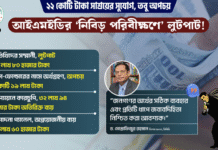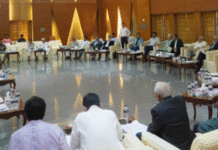
The Anti-Corruption Commission on Monday found 40 per cent physicians absent from their workplaces at public hospitals and health centres.
Enforcement teams of the commission revealed the information after conducting sudden drives at 11 public hospitals and health centres in eight districts.
The commission teams found 92 of the 230 doctors present at the public hospitals and health centres between 9:00am and 2:00pm on Monday.
Absence of doctors from the workplace is considered as a major irregularity in the public sector heath services in Bangladesh that deprives patients of proper healthcare.
According to Bangladesh Medical Association, there are about 21,000 doctors in the public hospitals, institutions, and health centres.
At a meeting at a Dhaka hotel on August 29, 2018, the then health minister Mohammad Nasim said that 3,000 doctors were on the payroll without discharging their duties at the government healthcare facilities.
‘I had ordered ministry officials to identify the errant doctors, but they failed to provide the names,’ the minister said.
He lambasted the doctors who did not want to work at the health centres in the rural areas.
Prime minister Sheikh Hasina also expressed concerns time and again over the absence of doctors from hospitals and government healthcare facilities.
Both Hasina and Nasim, on several occasions, had warned that stern actions would be taken against doctors absent from the healthcare facilities, but reports of such action had hardly ever been gathered.
On December 27, 2018, voicing displeasure at the unwillingness of the government physicians to ensure presence at the hospitals, Sheikh Hasina said that the doctors who would fail to stay at the station must vacate their positions paving the way for fresh recruitments.
‘If they refuse to remain stationed in their workplaces, then they might as well discontinue their job. They are free to earn huge money by pursuing private practices in Dhaka,’ she said.
‘Doctors posted at the upazila-level hospitals refuse to stay there. This problem prevails in the government jobs. Wherever they are posted, they somehow manage to return to Dhaka,’ she said while handing over the keys of ambulances to 98 government hospitals, upazila health complexes and health institutions at her office in Dhaka.
According to the World Health Organisation, though Bangladesh’s 70 per cent people live in the rural areas, 70 per cent of the doctors live in the urban areas, depriving a large population of medical treatment.
Against such backdrops, the commission conducted the drives at Government Employee Hospital, Nazira Bazar Government Mother and Children Health Care Hospital and Mugda 500-bed General Hospital in Dhaka, Pirgachha Upazila Health Complex in Rangpur, Godagari Upazila Health Complex in Rajshahi, Sadar Upazila Health Complex in Dinajpur, Delduar Upazila Health Complex in Tangail, Muktagacha Upazila Health Complex in Mymensingh, Kumarkhali Upazila Health Complex in Kushtia and Sadar General Hospital and Atgharia Upazila Health Complex in Pabna.
Commission director general Muhammad Munir Chowdhury said that the commission sent the teams to the hospitals and health centres following a phone call at its hotline 106.
He said that someone complained that service seekers were facing hassles, forced to bribe and in most cases physicians were absents from the hospitals.
During the drives, he said, a team of the commission caught a stretcher-bearer red-handed while taking money from a service seeker at Mugda 500-bed General Hospital in Dhaka.
Following the incident, the hospital authority suspended the employee, Abu Musa Bhuyan, he said.
He further said that the commission teams found that most doctors of the public hospitals and health centres were involved in private practice ignoring their duties.
They also found that most officials of the upazila health complexes were not attending office but drawing full salary, he said.
He said that the commission was planning to send some recommendations to the health ministry to prevent corruption in the health sector.
Source: New Age.









